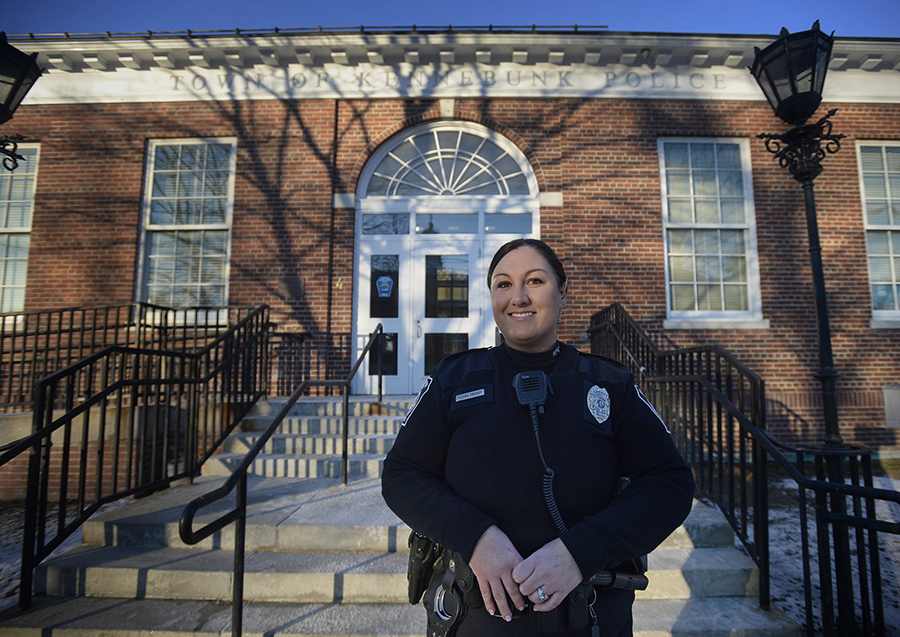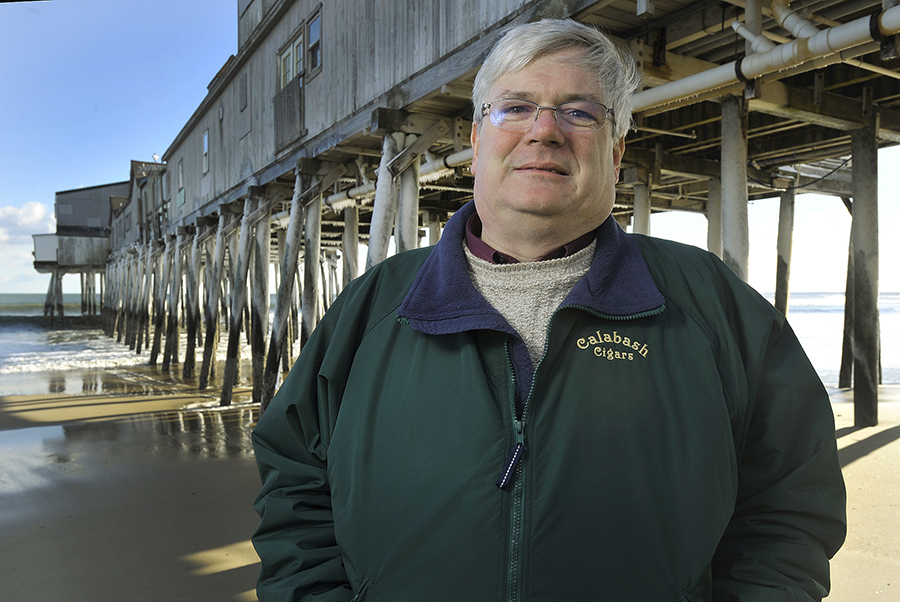Maine stole its share of the spotlight in 2013. Before we say goodbye to the year that was, here’s a look at some of the people behind the headlines of 2013 and where they are now.
-

-

Kennebunk police officer Audra Presby out front of the Kennebunk police department Friday, Dec. 13, 2013. Presby was the lead investigator in the prostitution scandal that captured international attention. Shawn Patrick Ouellette/Staff Photographer
Lead investigator of Zumba prostitution case looks back at unforgettable year
Kennebunk police Officer Audra Presby spent nearly two years occupied with the case.
O
fficer Audra Presby may never have another case like the one that thrust her into the spotlight in 2013. But she’ll be better prepared for it if she does.
Presby was the lead police investigator in Kennebunk’s high-profile prostitution case. And, while her investigation began in 2011, it culminated this year with the conviction of Alexis Wright on prostitution charges, the dramatic trial of Wright’s business partner, Mark Strong Sr., and convictions of nearly all of the 68 people who were accused of hiring Wright for sex.
Presby, a 40-year-old rank-and-file patrol officer, investigated them all using hundreds of hours of lurid videos that Wright recorded, and a detailed client ledger she kept for her business. The case continued to capture international media attention even as Wright completed her jail sentence in front of television cameras last month.
“I worked solely on this case. I didn’t take any other calls for service. This is what I did for the latter portion of two years,†Presby said in a recent interview at the Kennebunk police station.
Before being assigned to investigate reports of “moaning and groaning†and men coming and going from Wright’s Pura Vida Zumba studio in Kennebunk’s quaint downtown, Presby had regular patrol duty responding to calls for anything from harassment complaints to robberies.
“When we were first starting this case, there was no way we knew the complexity or totality of it. We were naive. We were blown away,†Presby said. “Every time we opened a page or looked down another path, we were in another rabbit hole. It didn’t seem like there was going to be an ending, but that’s what made this case so interesting: We never knew what we were going to find every time we uncovered another rabbit hole.â€Â
In addition to the hundreds of hours of videos that police seized from Wright’s studio, office and home, they culled through thousands of pages of documentation of Wright’s interactions with Strong, a businessman from Thomaston who monitored all of Wright’s prostitution business over a live video feed from his hometown in Knox County.
The case became extremely personal for Presby after Strong’s attorney, Daniel Lilley of Portland, argued that Kennebunk police had investigated Strong in retaliation for Strong’s work as a private investigator looking into police officers’ lives. That included an affair Presby had with a superior officer, who is now her fiance.
Video: Kennebunk police officer Audra Presby
“I would come to work every day, and I would write on a whiteboard our notes for the day,†Presby said. “One through four ... eight, nine or 10 or whatever. The last one I would put down is ‘smile.’ I needed to make sure I stayed focused every day, and it was hard. I’d be lying if I said to you it wasn’t very hard.â€Â
Presby tried to protect her sons, ages 14 and 10, as the case became personal. She said she was thankful for the “amazing support†she got from her police chief, fellow officers, her family and her fiance.
“I came in here every day to do my job. And even when I started with that case, I remember saying, ‘Audra, you’re not in the police car today, you’re in the office. You’re not looking at burglary. You’re looking at videos,’ †she said. “And that was, unfortunately, what I had to do, and I did it. I came in here focused.â€Â
Kennebunk police also came under fire from people who criticized the department from both sides, alternately for publicly releasing the names of Wright’s customers as they were charged, and for not charging all 140-plus people who prosecutors said were named in Wright’s ledger.
“If we didn’t have enough evidence to go forward, we didn’t go forward. There is no coverup,†Presby said. “Does that frustrate us? Absolutely. Are there people out there who know they were part of this investigation (and) not on this biweekly blotter? Yes, it’s very frustrating.â€Â
Looking back, Presby said, she would go about the investigation much the same way, even though she feels much more experienced now.
“I think I’m forever changed by this case, but overall I’m a much more prepared officer than I ever was,†Presby said. “An interesting year, certainly one that I will never forget and one this agency will never forget.â€Â
-

Gloria Noyes, the 2009 Maine Teacher of the Year, is Principal at the Russell School in Gray on Monday, December 16, 2013. Gordon Chibroski, Staff Photographer
Portland loses 'Teacher of the Year' to Gray-New Gloucester
Gloria Noyes, who first made headlines as Maine’s 2009 Teacher of the Year, was in the news again this spring when her job was targeted for elimination in the Portland Schools budget.
Leslie Bridgers, Staff Writer
G
loria Noyes first made news as Maine’s 2009 Teacher of the Year. But she was back in the headlines in the spring of 2013 when her job became one of about 50 slated for elimination in the Portland Schools budget.
And, by the end of this year, Noyes had gone from being a fifth-grade teacher in Westbrook to a first-time administrator in Portland, to getting laid off and rehired, and finally ending up as the principal of two elementary schools in the Gray-New Gloucester district.
“I kept thinking, ‘Oh my gosh, in nine months ... I can’t even have a baby that quick,’†Noyes, 42, said this month from her home in Westbrook.
She had started the school year in Westbrook, where she grew up, got her first job, taught fifth-grade at Congin School for 18 years and imagined she’d always stay.
After taking classes through an online doctorate program offered to her for free as part of her Teacher of the Year prize, she decided to become an administrator to broaden her impact and support teachers the way she’d been supported.
Half a year into her new job as assistant principal of Fred P. Hall Elementary School in Portland, however, she became the poster child for the argument against layoffs. School districts around the state faced potential budget cuts after the LePage administration proposed cutting local revenues and shifting teacher retirement costs to school districts, and Portland was among the hardest hit.
Noyes, who had no seniority or job protection, found out last spring her position could be cut. The uncertainly went on for months.
“Every school board meeting I kind of hung on for dear life,†she said.
Worried about losing her income and insurance, the wife and mother of two boys started looking for a new job. At a school board meeting in May, her position was eliminated.
“This should not happen,†Casco Bay High School Principal Derek Pierce said at the meeting. “Who would want to join a district that lets go a Teacher of the Year?â€Â
In June, she was offered the position in Gray-New Gloucester as principal of the James W. Russell and Memorial elementary schools. Right around the same time, the Portland school board restored her job in the city.
“I was very torn,†she said. “I just didn’t feel that I would be safe again the next year, and I had to look out for my family. I couldn’t go through what I went through again.â€Â
Noyes now feels settled in her new role -- and is staying put.
“I don’t want to go anywhere,†she said.
-

Adriana Garcia, 59, was among the Lewiston residents displaced in the first of a string of arsons last spring. Garcia lost all of her possessions in the blaze that engulfed her apartment building April 29, 2013. But in a Dec. 23, 2013 interview she said she still struggles to handle the psychological trauma the fire caused her. Matt Byrne/Staff Writer
Displaced by Lewiston arsons, woman loses more than just possessions
For Adriana Garcia, 59, the psychological damage has proved most painful.
Matt Byrne, Staff Writer
A
driana Garcia used to have a can-do attitude. She jumped to greet a challenge. People used to depend on her, and she relished the role.
But all of that ended April 29, when the building on Bates Street that she helped manage, the place she called home for eight years, burned in the first of a string of arsons that made headlines around the state.
“I think about it every day,†said Garcia, 59. “Ever since that fire, my life has never been the same.â€Â
Garcia was one of the nearly 200 residents displaced in three blazes that claimed several multi-unit apartment buildings between April 29 and May 6, highlighting the housing crisis in Lewiston’s decaying downtown, where good jobs are tough to come by and vacancy rates top 25 percent.
For the already-poor residents, the fires threw them deeper into crisis. Garcia, like everyone who was displaced, lost all of her possessions, furniture, clothes and family keepsakes. And, seven months later, with the furniture replaced and her living situation back on an even keel, the psychological damage remains raw.
She recalls waking up to a thick cloud of smoke inside her bedroom. Flames covered the exterior of the building. She could see them glow through her window. At that time, Garcia was recovering from a broken leg, and was forced to hobble from her apartment shoe-less and without crutches.
Her mind would not let go of the moment. In a recurring nightmare, Garcia is trapped in her apartment and never escapes.
For weeks, she went through the motions of recovery. She accepted donations from the myriad groups that clamored to help. She found a new apartment and moved in. She got new clothes, new furniture.
Yet, something inside of her had changed, she said. It was as if a lifetime of resilience, of confidence, burned up with her belongings.
She was previously a manager for her old building, a role that won her reduced rent. Now, after the fire, she struggles to leave the house.
“I didn’t fully grasp what I’d gone through,†Garcia said. “I didn’t do anything. I still don’t. I’m scared.â€Â
While Garcia has received some psychiatric care for post-traumatic stress disorder, she still has trouble fathoming a full return to her old life.
Her financial problems have compounded since the fire, too, as she and her husband, a roofer, have gone into debt for reasons unrelated to the fire and she briefly lost health insurance coverage.
In all, Garcia said, 2013 has been the most stressful in her life.
“I lost myself,†she said. “That’s what I’m trying to get back.â€Â
-

Michele Sturgeon, photographed on Tuesday, December 24, 2013, has been unemployed since took a buyout from the city of Portland where she was under fire as the city's health inspector. John Ewing/staff Photographer.
Portland restaurant inspector leaves her job, with strings attached
Upon resigning from her position in August, Michele Sturgeon received $18,600 and signed a contract agreeing “never to disparage or speak ill of the city.†.
M
ichele Sturgeon made headlines for doing her job during the past couple of years. In 2013, she made news for leaving it.
Sturgeon took an $18,000 buyout to step down as the city of Portland’s health inspector in August, and she has been unemployed since.
After 18 years working in municipal government –16 years in South Portland and two years in Portland – Sturgeon said she is glad to be out of the spotlight.
“It’s been a good thing for me health-wise and mentally wise,†said Sturgeon, 48.
Sturgeon was hired in 2011 to clean-up the city’s restaurant inspection program. Until she was hired, inspections were conducted sporadically by code enforcement officers, rather than on a periodic basis by a state-certified health inspector.
Sturgeon failed 19 out of the first 23 restaurants she inspected. The following year, nearly half of the 88 restaurants she inspected failed.
She quickly earned the reputation of being a strict inspector. Restaurant owners complained that she was holding them to impossibly high standards.
Sturgeon found herself in the middle of a media maelstrom in the fall of 2012 when she closed three waterfront businesses – the Porthole, Comedy Connection and the Harbour’s Edge Banquet Hall -- because of a serious rat infestation. The Porthole has since been re-opened under new ownership and Boone’s Fish House Oyster Room now occupies the former banquet hall.
Sturgeon went out on medical leave last December for five months. She returned for a short time, before resigning in August. She signed a contract agreeing “never to disparage or speak ill of the city or any of its products, services, affiliates, officers, directors, or employees in their professional capacities.†In return, she was paid $18,600.
Sturgeon, who lives in Portland, could not talk about her time with the city because of that agreement. She said she is currently working on starting up several business ventures, at least one of which will be food-related. She decline to provide details, citing competitive reasons, but said several of the ventures could launch by this summer.
When she is not working on her business plan, Sturgeon said she volunteers for the Portland Hour Exchange, an agency that brings people together who want to exchange a service for a service, rather than pay money for it.
“It’s an amazing program,†she said.
-

Former Old Orchard Beach town councilor Michael Coleman, photographed under the Old Orchard Beach pier on Monday, December 16, 2013, says he has no regrets over the political discord that has plagued his town. John Ewing/staff Photographer.
Former councilor doesn’t dwell on Old Orchard Beach recall
Six months after he was recalled from office, Michael Coleman says the town is better off with its current town council and manager.
L
ooking back on the seven months of political discord that plagued Old Orchard Beach in 2013, former town councilor Michael Coleman says he is certain of two things: He would do nothing differently and the town is now better off than it was before.
Coleman was one of six town councilors recalled from office in a June election, the fallout of a tense debate among councilors about the firing of the town manager.
“Would I like to be there? Sure. But I don’t dwell on it,†Coleman said. “The main goal was to get a reset in town politics and we achieved that.â€Â
The tension among the Town Council emerged in December 2012 when councilors first talked about firing Town Manager Mark Pearson, and it boiled over in March, when the four-member majority voted to end Pearson’s contract with the town.
Groups of residents unhappy with both factions of the Town Council launched rival recall campaigns with accusations of stolen signs, stalking and the use of racial slurs. Only one councilor, Robert Quinn, survived the recall election.
Coleman was the most vocal member of the minority faction that opposed firing Pearson, who has since filed a lawsuit against the town.
“If I had known the result of this whole thing would be me losing my seat, I would do it all over again,†he said. “The whole idea of obtaining a reset in town politics was more important than one of us in particular.â€Â
Since the recall election, Coleman has turned his focus to starting his own consulting business, Grand Slam Strategies. His consulting work includes helping groups in other communities that want to recall town councilors or selectmen.
He has stayed involved in politics through the Republican State Committee and his role as budget chairman for the party. He recently traveled to Montreal to push for train service to Maine, which he said would benefit tourism in Old Orchard Beach. He is considering joining the Planning Board or another town committee, but isn’t in a rush .
Coleman said he would consider running for Town Council again in the future.
“I certainly learned a lot,†Coleman said. “Politics can be a contact sport.â€Â
-

Mark Amundsen, president of Nova Star Cruises, poses for a photo on Wednesday, December 18, 2013 behind a 6-foot-long model of the Nova Star ferry, which will be coming to Maine in April. John Ewing/staff Photographer.
Maine man strikes deal to revive international ferry service
Mark Amundsen, a soft-spoken engineer from Eliot, has crunched the numbers and is convinced that his Maine-to-Nova Scotia ferry can succeed where others failed.
M
ark Amundsen, the Eliot man who made news in 2013 by landing a deal to revive Maine-to-Nova Scotia ferry service, is not your classic fast-talking entrepreneur with a slick sales pitch.
Rather, he’s the opposite: a soft-spoken engineer driven by data. And it’s that data, he said, that convinced him that a ferry service can be successful and that he has the ability to make it happen.
“The numbers add up,†said Amundsen, who is president of Nova Star Cruises.
Amundsen, who grew up in Ipswich, Mass., graduated from Maine Maritime Academy in Castine in 1981. He has 30 years of experience in marine transportation, including overseeing three shipyards in Nova Scotia.
Because of his work in Nova Scotia, he had been a frequent a passenger on the Scotia Prince, a ferry that traveled between Portland and Yarmouth until 2004. After the ferry service abruptly suspended its 2005 season, Amundsen found himself driving 12 hours to Halifax and wondering why the ferry service failed.
He analyzed data for both the Scotia Prince and the high-speed ferry, The Cat, which also once ran between Maine and Nova Scotia. In 2003, for example, when the Scotia Prince was operating between Portland and Yarmouth and The Cat was operating between Bar Harbor and Yarmouth, the two services carried a combined total of 300,000 passengers, he said.
The Scotia Prince lost customers in Portland because its public complaints about mold at the city-owned Portland International Marine Terminal was a marketing blunder, he said. The traveling public began to associate the ferry service with mold rather than luxury, he said.
The Cat, which in 2006 took over the Portland to Yarmouth run, wasn’t successful because the crossing was unpleasant in less-than-perfect weather, and the vessel didn’t offer many amenities, he said.
Nova Star Cruises plans to begin offering daily round-trip service between Portland and Yarmouth in May using a new ferry that is somewhat larger than the Scotia Prince.
Amundsen said he is convinced that a cruise-ferry like the Scotia Prince will attract passengers as well as commercial truckers. That conviction allowed him to keep pushing forward even after that Nova Scotia government rejected his first proposal last March, according to his 23-year-old daughter, Jordan Killkelley.
“You can’t do this without believing in yourself and what this possibly could be,†she said.
-

Missing skier Nicholas Joy, 17, of Medford, Mass., is led to an ambulance on March 5, 2013 after spending two nights lost near Sugarloaf ski area. David Leaming/Staff Photographer

Joseph Paul of Massachusetts speaks with a game warden after bringing missing skier Nicholas Joy out from the Caribou Pond trail near Sugarloaf on March 5, 2013. David Leaming/Staff Photographer
Snowmobiler's rescue ends a tense two-day search for missing skier
Nicholas Joy, of Medford, Mass., disappeared while skiing on the Carrabassett Valley mountain with his father.
T
en months have passed since Joseph Paul rescued a 17-year-old skier who got lost on Sugarloaf Mountain and survived two nights in 20-degree temperatures by building a snow cave.“I wonder (about him)†said Paul, 44, of Warwick, Mass. “I’m assuming he’s doing fine and moved on with his life.â€Â
He spent the days following the March 5 rescue answering media calls and being congratulated by friends and strangers. “I was bombarded,†Paul recalled.
Nicholas Joy, of Medford, Mass., disappeared while skiing on the Carrabassett Valley mountain with his father. At one point in the two-day search, more than 80 wardens, border patrol officials and mountain rescue crews scoured the area, sometimes working in zero visibility.
Paul, who grew up in Sweden, Maine, had come to a family camp in nearby Salem to snowmobile and decided to go out and look for Joy. About 12 miles from his camp, Paul got onto a closed snowmobile trail.
“I happened to see some footprints,†he recalled. “They were zig-zagging all over the place. He (Joy) was wearing ski boots and at first the prints looked like an animal dragging itself. I realized that it wasn’t an animal — it was somebody walking.â€Â
Paul, a Warwick Fire Department captain and experienced searcher, headed toward Joy. “He was in pretty good shape and there was no visible frostbite.â€Â
Paul gave Joy what food he had — some crackers and peanuts, for which the boy was grateful, he said, and drove him to a waiting ambulance about four miles away near Route 27.
Paul never saw Joy again, he said.
“His mother called me a month afterward and thanked me for finding him. She said she was really grateful that I found him and brought him back to her and that they’d come out to see me at some point, but that never happened.â€Â
Efforts to reach Joy and his family for comment were unsuccessful. His Facebook page says he is a 2013 graduate of Medford High School.
Paul said Joy basically saved his own life by building a snow shelter to protect against the freezing night air, but didn’t have the gear to survive for long. “I don’t think he would have made it much longer because of the conditions. Your body starts shutting down after a while.â€Â
Paul said he is glad he was able to find Joy, but didn’t seek the attention he got as the man who rescued the boy. And he says the event was probably more of a life-changing experience for the teenager than it was for him.
“I’m not a public person,†he said. “I kind of keep to myself for the most part. I’m on the Fire Department because I like to help people.â€Â
-

Maine State Trooper Diane Perkins-Vance on Monday, Dec. 23 in Augusta. Staff photo by Andy Molloy.

Christopher Knight sits at his camp in the Maine woods in April after he led authorities to his campsite. Courtesy photo by Maine State Trooper Diane Perkins-Vance.
After 30 years, the case of the North Pond Hermit is finally closed
“Everyone refers to him as a hermit. But he’s actually a human being. His name is Christopher Knight,†says Maine State Police Trooper Diane Perkins-Vance.
Craig Crosby, Staff Writer
S
he talks about the campsite, how he survived in the cold all those years, and how many burglaries he committed during that time.Maine State Police Trooper Diane Perkins-Vance knows the next question. It always comes. Does she believe it’s true? Did Christopher Knight, the man known as the North Pond Hermit, really spend nearly 30 years in the woods of central Maine and talk to only one other person?
About eight months after she arrested him, Perkins-Vance’s answer is the same.
“I have no doubt whatsoever that he was living there for 27 years,†she said. “I don’t waver whatsoever.â€Â
That conviction took root in April when Knight led Perkins-Vance and Sgt. Terry Hughes of the Maine Warden Service to a campsite in the woods of Rome that Knight had called home for decades. Everything about the encampment seemed to verify Knight’s story that he left civil society and went into the woods in 1986 and over the next 27 years spoke to only one person, a hiker.
Whatever doubt remained about the story evaporated during the many interviews Perkins-Vance conducted while investigating Knight’s claims of more than 1,000 break-ins he committed at area camps to steal supplies.
“There was a lot of personal information to get to know Chris Knight and why he did this,†Perkins-Vance said. “You had to know everything to put all the pieces together.â€Â
Perkins-Vance warned Knight that the information about his arrest was public and that his story would likely attract significant attention.
But even Perkins-Vance was unprepared for the media frenzy that erupted after Knight’s arrest was first reported on April 10 by the Kennebec Journal. Perkins-Vance was pursued by media outlets across the world, each hoping for a new nugget of information to pass along about the mysterious Maine man who became known as the North Pond Hermit.
Perkins-Vance says it has become the most high profile case she has ever worked.
“I expected it to get national attention,†she said. “I didn’t expect it would get worldwide attention. I can’t begin to tell you how many interviews I did.â€Â
Burglaries at camps around North Pond and other lakes in the Rome, Smithfield and North Belgrade area had become so routine over the years, and the perpetrator so elusive, that Knight’s legend grew even before people knew who he was. The break-ins had an unsettling effect on camp owners, Perkins-Vance said, and it was exciting to solve the mystery. That excitement was replaced by the daunting realization that she had to single-handedly investigate nearly 30 years' worth of burglaries.
“This took a lot of investigating, a lot of interviews with him, to put the whole story together,†Perkins-Vance said. “I still had to carry out all the other duties required by my job as a rural trooper. It was just a tremendous amount of work.â€Â
Because of the statute of limitations, Knight was ultimately held responsible for only a fraction of the burglaries he later acknowledged committing. On Oct. 28, he pleaded guilty to seven burglaries and six thefts between July 14, 2008, and April 4 in Rome and Smithfield. Knight was admitted to the Co-Occurring Disorders Court, which allowed him to be freed from jail while receiving counseling for an alcohol problem while remaining under court supervision. Generally, people spend at least a year in the court program, and most take two years to complete it.
Knight spent seven months in jail before his Nov. 4 release and won’t go back if he successfully completes the program.
Video: riding with Maine State Police Trooper Diane Perkins-Vance
His attorney, Walter McKee, said in September that Knight had places to work and live lined up for his release. In November, McKee and Kennebec County District Attorney Maeghan Maloney said those are still in place, but they wouldn’t say where because they didn’t want to subject Knight to excess attention.
“I think he will follow what is expected of him, based on what I know of him,†Perkins-Vance said.
Perkins-Vance’s life, much to her relief, has since returned to normal. Looking back, she is glad she had the opportunity to see the investigation through from the time of Knight’s arrest to his guilty plea.
“I’ve had no further involvement with Knight since his case was resolved in court,†she said.
In one sense, Knight has a lot in common with other burglars Perkins-Vance has arrested: He took things that did not belong to him and his actions hurt those from whom he stole.
However, Knight’s lifestyle made him a once-in-a-lifetime study, Perkins-Vance. His will to withdraw from society not only made him intensely interesting to the general public, but it also proved compelling to the officer assigned to investigate his case.
“To live in the Maine woods for 27 years, in the elements, is unique and interesting,†she said. “It was interesting to learn about him.â€Â
Perkins-Vance's involvement has given her a perspective on the North Pond Hermit.
“Everyone refers to him as a hermit. But he’s actually a human being. His name is Christopher Knight.â€Â





Further Discussion
Here at PressHerald.com we value our readers and are committed to growing our community by encouraging you to add to the discussion. To ensure conscientious dialogue we have implemented a strict no-bullying policy. To participate, you must follow our Terms of Use.Questions about the article? Add them below and we’ll try to answer them or do a follow-up post as soon as we can. Technical problems? Email them to us with an exact description of the problem. Make sure to include: